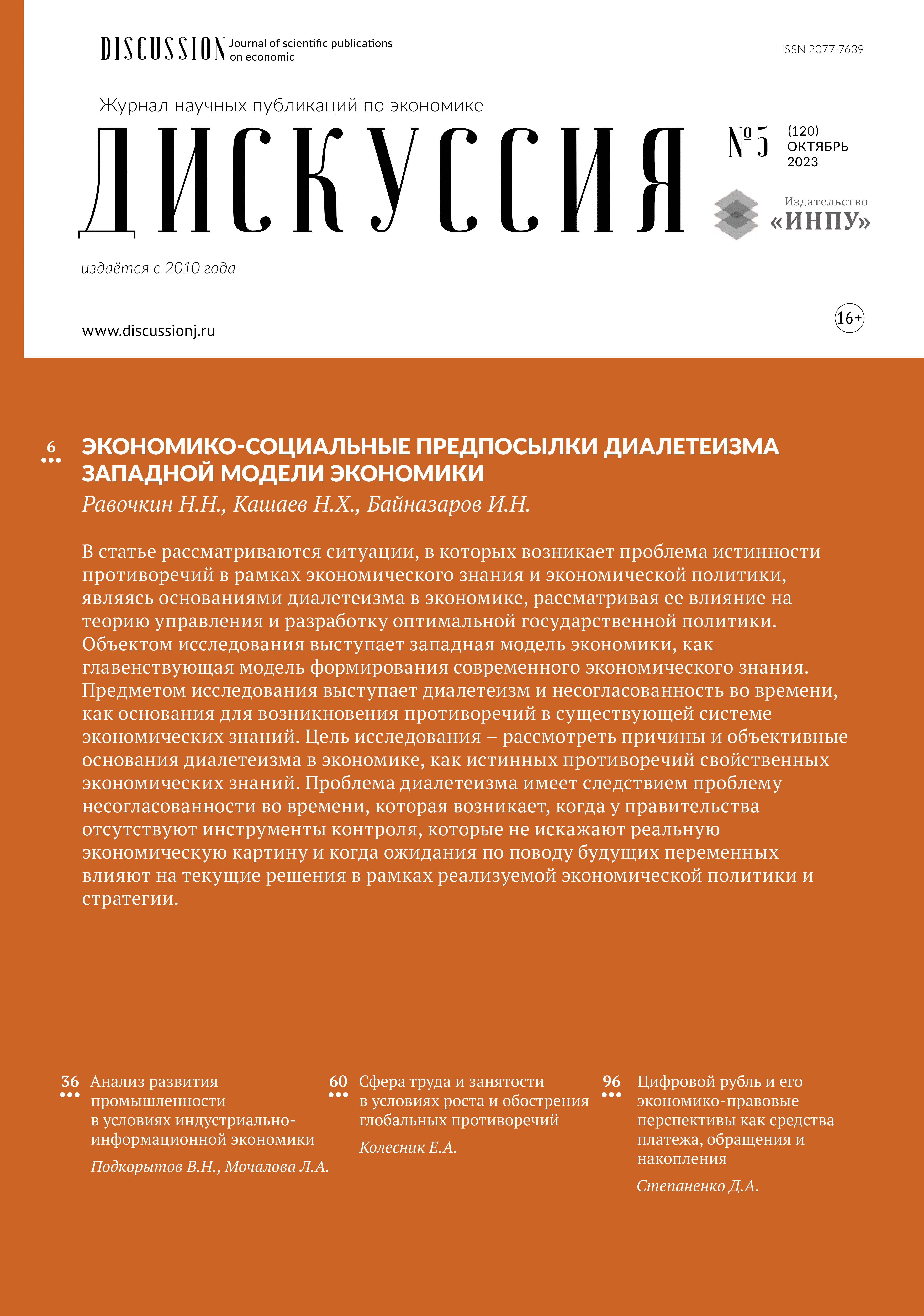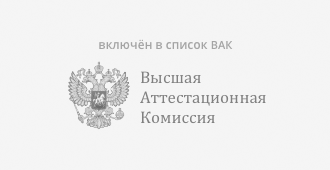HOUSEHOLD AS A SUBJECT OF INVESTMENT ACTIVITY
Keywords:
Household, market subject, institution, economic subject, household management, optimization of household activity, rational use of resources, household savings, investment activity, institutional environmentAbstract
The study of a household from the point of view of one or another direction of economic theory reveals only its individual characteristics inherent in it at certain stages of development as an institution or an economic entity. The article presents the results of a scientific study of the theoretical foundations and economic essence of such a subject as a “household”, the main aspects of the household as an economic category are studied, the fundamental role of households in the formation and functioning of socio-economic systems of various scales is determined. The necessity of regulatory regulation of the activities of households as economic entities with the corresponding rights and obligations is substantiated. The common features and differences with corporate economic entities are analyzed. The application of systemic, institutional and structural-functional approaches allowed us to determine the patterns of functioning of households and their place in the national economy. The paper examines the essence of the investment function, which is inherent and necessary for any economic entity to ensure the growth of asset capitalization and financial stability in the face of external challenges and uncertainty. The ways of solving this problem are proposed, which will make it possible in the future to increase the effectiveness of state regulation of the economy, enterprises and households, since the prospects for improving the standard of living of the population and the development of the Russian economy depend on the financial stability of the latter, as well as on competent investment strategies.
Materials and methods. The article reveals the concept, the economic essence of households, as well as the prospects for the growth of their influence on the development of modern socio–economic systems in the paradigm of modern economic theory. The study analyzes the structure, patterns of life activity, as well as the typology of households. The article provides a detailed theoretical analysis of the concept of “household”, its economic essence is considered, the author’s interpretation of the concepts of “economic entity” and “household savings” in the framework of the reproductive approach is proposed. The scientific substantiation of the economic subjectivity of a household as a full-fledged participant in investment activity is given, the peculiarities of investment behavior of households are revealed, the key factors preventing the increase in investment activity of households are systematized. The author’s interpretation of the economic category “household” is proposed. The paper examines the essence of the investment function, which is characteristic of every economic entity, including a household, to ensure the capitalization of assets and financial stability in the face of external challenges and uncertainty. The necessity of the development of investment activity of households and the development of appropriate provisions in the development strategies of municipalities is substantiated.
Discussions/Conclusions. The results of the study will justify the need to consider households as economic entities and create conditions for the development of their investment activity. At the municipal level, it is proposed to create conditions for increasing the investment activity of households, including improving the regulatory framework. The authors believe that this problem of the modern economy is one of the priorities, the solution of which will allow in the future to increase the effectiveness of state regulation of the economy at the municipal, regional level, since the prospects for growth in the level, quality of life of the population and socio–economic potential of the country depend on the financial stability of households, as well as on the success of investment strategies.
Downloads
Metrics
References
Богомолова Т. Ю., Черкашина Т. Ю. Институционально-экономический контекст формирования нефинансового богатства российских домохозяйств: от приватизации к приобретению // Мир России: социология, этнология. 2020. Т.27, № 2. С.62-89. DOI: 10.17323/1811-038X-2018-27-2-62-89.
Аренс Х. Д. Жизнеспособность фермерских домохозяйств в России: теоретические подходы и практические выводы // Проблемы прогнозирования. 2019. № 3. С. 65-79. EDN: FBGZCT.
Мкртчян Г. М. Влияние климата на субъективные оценки благосостояния домашних хозяйств России // Регион: экономика и социология. 2019. № 3. С. 254-276. DOI: 10.15372/REG20170313.
Friedman M. A. Theory of the Consumption Function. Princeton: Princeton University Press, 1957. 240 p. DOI: 10.4236/jmp.2012.311226.
Авакян-Форер А. Г. Экономический субъект в философской мысли: ретроспектива и современность // Философская мысль. 2021. № 2. С. 45-52. DOI: 10.25136/2409-8728.2021.2.33067.
Затолокина А. В. Оценка стоимости жилья и капитализации дохода домохозяйств при формировании налога на имущество // Экономика. Налоги. Право. 2019. № 1. С. 27-31.
Кормишина Л. Г. Домашнее хозяйство: экономический анализ и управление. М.: Экон-Информ, 2018. 240 с.
Богомолова Т. Ю. Нефинансовое богатство российских домохозяйств: собственность и налоги // Мир России: социология, этнология. 2021. Т. 30, № 3. С. 51-77. DOI: 10.17323/1811-038Х-2021-30-3-51-77.
Федорова А. Ю. Анализ экономического поведения домохозяйств в условиях неопределенности // Экономика. Налоги. Право. 2019. № 2. С. 79-83.
Лебедева Л. Ф. Доходы американских домохозяйств в условиях пандемии // Мировая экономика и международные отношения. 2022. Т. 65, № 12. С. 27-32. DOI: 10.20542/0131-2227-2021-65-12-27-32.
Нартикоев А. Р. Эндогенная классификация домохозяйств в регионах России // Экономическое развитие России. 2021. Т. 28, № 3. C.107-128. DOI: 10.32609/0042-8736-2021-5- 107-128.
Петрова Д. А. Оценка инфляционных ожиданий домохозяйств // Экономическое развитие России. 2019. Т. 26, № 3. С. 48-51. EDN: ZAQMDB.
Долженко Р. А. Трансакционные издержки в системе социально–трудовых отношений // Журнал экономической теории. 2019. № 2. С. 132-144. EDN: ZDMVNP.
Беляева Е. В. Анализ факторов, влияющих на экономическую активность населения в условиях глубокой интеграции // Экономика и управление. 2019. № 2 (197). С. 46-51.
Голованова А. Н. Современное состояние и развитие домохозяйств в Российской Федерации // Молодой ученый. 2019. № 30 (217). С. 322-327.
Мамедли М. О. Финансы домохозяйств в России: шоки дохода и сглаживание потребления // Вопросы экономики. 2019. № 5. С. 69-91. EDN: XMGGFV.
Петрова А. Э. Домохозяйства и рынок. Москва: НИЦ ИНФРА-М, 2019. 168 с.
Разорвин И. В., Куликова Е. С., Логинов М. П. Маркетинговые инструменты развития территорий: учебное пособие. Екатеринбург, 2016. 304 с.
Хромов М. Домашние хозяйства переходят к кредитной модели потребления // Экономическое развитие России. 2018. № 8. С. 40-41. EDN: XWPCUX.
Гальперова Е. В. Анализ долгосрочных тенденций потребления энергоресурсов домохозяйствами // Проблемы прогнозирования. 2019. № 2. С. 51-62. EDN: KPCJQS.
Глебкова И. Ю. Денежно–кредитное регулирование сбережений домашних хозяйств в Российской Федерации: статистический анализ // Финансовый бизнес. 2020. № 2. С. 8-15. EDN: NOYUUD.
Ниворожкина Л. И. Текущие доходы и финансовое поведение домохозяйств: кто в кризис теряет больше? // Прикладная эконометрика. 2018. Т. 48, № 4. С. 85-96. EDN: ZVRMWR.
Коваль П. К. Оценка потребительского поведения домохозяйств в РФ // Вопросы экономики. 2022. № 3. С. 98-117. EDN: CFOMBM.
Тагавердиева Д. С. Финансы домашних хозяйств: сущность и роль в развитии экономического потенциала страны // Финансовый менеджмент. 2022. № 3. С. 49-55. EDN: SFEMAU.
Downloads
Published
How to Cite
Issue
Section
Categories
License
Copyright (c) 2024 А. Т. Хайрутдинов, Р. И. Акьюлов

This work is licensed under a Creative Commons Attribution-NonCommercial-NoDerivatives 4.0 International License.
Авторы, публикующие произведения в журнале «Дискуссия», соглашаются со следующими условиями:
- Авторы сохраняют за собой авторское право и предоставляют журналу право первой публикации произведения, одновременно лицензированной в соответствии с лицензией Creative Commons Attribution, позволяющей другим лицам пользоваться произведением с подтверждением авторства и первоначальной публикации в журнале «Дискуссия».
- Авторы вправе заключать с иными лицами лицензионные договоры на условиях простой (неисключительной) лицензии на использование опубликованного в журнале «Дискуссия» произведения (например, размещение его в базах данных университетов, публикация в книге), со ссылкой на его оригинальную публикацию в этом журнале.
- Автор гарантирует, что является правообладателем всех материалов, предоставляемых в редакцию, и что исключительные права на данные материалы не переданы или не предоставлены другим лицам.
- Авторам разрешено и рекомендуется размещать свое произведение в Интернете до и во время процесса подачи, поскольку это может привести к продуктивному обмену, а также к более раннему и более широкому цитированию опубликованных работ.
С момента загрузки произведения и сопроводительных материалов через раздел "Отправка материалов", автор полностью и безоговорочно принимает (акцептует) публичную оферту о заключении авторского соглашения об опубликовании произведения. В соотвтетствии с этим соглашением автор предоставляет издателю на безвозмездной основе неисключительную лицензию на использование созданного автором произведения.
С момента получения произведения и прилагаемых к нему материалов журнал "Дискуссия" вправе использовать полученные произведения без ограничений по своему усмотрению и в пределах всего срока действия исключительных прав, но с обязательным указанием имени автора (авторов) произведения, в том числе публиковать произведения (полностью или в сокращении) на территории всего мира, переводить на другие языки, направлять в репозитории научной информации, размещать в сети Интернет и использовать другими законными способами.









